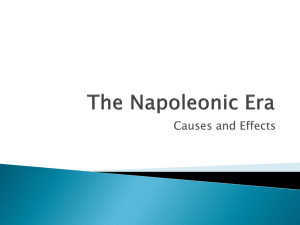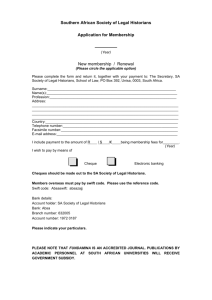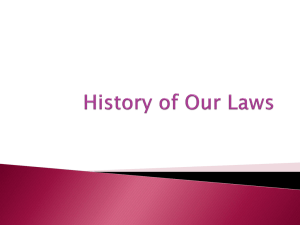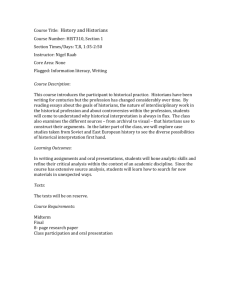Bergman*s Timeline Lesson
advertisement
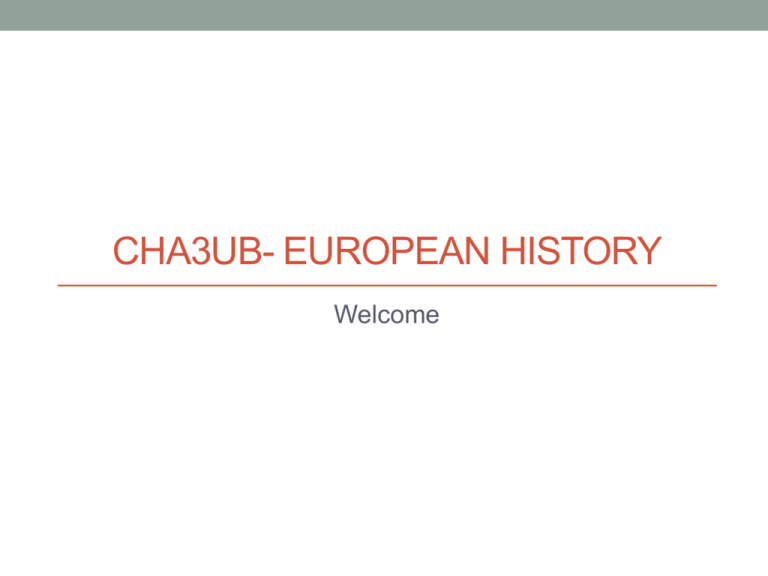
CHA3UB- EUROPEAN HISTORY Welcome Mr. R. Bergman • richard.bergman@tldsb.on.ca • http://rbergman.weebly.com • Office: 223 • Prep: Period 4 • CHC2DB and CHY4U European History • 1815- 1914- relative • The French Revolution- why? • Effect of the revolution on Europe (and the world) • Politics, Economics, Society, Culture, etc… • Sprinkle of Enlightenment, dash of Liberalism, another dash of conservatism and a good ¼ cup of Nationalism • But what exactly are those ‘isms’ above? The IB Curriculum • Unification of Italy(1815- 1861) • - Revolutions in Italy (and all of Europe) • - Piedmont-Sardinia • - Mazzini, Garibaldi, Cavour • - Austria • Unification of Germany (1815- 1890) • - Revolutions in Prussia and the German States • - Economics/Zollverein • - Crimean War, Austro-Prussian War, Franco-Prussian War • - Bismarck, Kaiser Wilhelm I, II • - Bismarck…yep again The IB Curriculum • Imperial Russia 1853- 1924 (hmmmm…more like 1815- 1894- I’ll will tell you why, just not now, because I don’t want to) - Russia- European? Asian? Or other? - Nicholas I, Alexander II, Alexander III - Serfs, Serfs and more Serfs - Crimean War - Mir - Assassination The Course Breakdown A. Units of Study- previous slide, plus: Europe Pre -1815 (Revolutionary Europe, Napoleonic Wars, Congress of Vienna) B. Content Lecture driven, supported by readings, applied through seminars- make sense? Knowledge is essential The Course Breakdown C. Assignments 1. Reading Questions/Assessments- completion and analysis 2. Essays- one per unit, argumentative, supported by research (secondary) 3. Historical Investigation- within the context of this course- independent, process 4. Final Exam- essentially a practice for next years IB exam 5. Unit Tests- structured similar to IB papers 1, 2, and 3 6. *Participation Not your typical high school class- assignments are rather consistent with very specific expectations The Course Breakdown Communicate constantly Read everything- take notes Pay attention during lectures- TAKE NOTES- and then review the daily work as often as you have time for Make sure you are aware of the expectations of assignments- got some questions…ask European History • Napoleon Bonaparte, Emperor of France • Reaction to Revolution- security in post-Napoleonic Europe • The Congress of Vienna • Liberal and Nationalist reaction Where to begin? What history is and is not • ‘history’ and ‘the past’- we must learn to use them differently • History is a narrative text, written in the present, about the subject of the past, using evidence that the past has left behind • All history is an interpretation of the past and never the same thing as the past • Significance to some, insignificance to others So Now What? If History is accessible to the masses on any level it is when asking controversial question….and using LISTS! Get together- The Top Ten Most SIGNIFICANT historical moments of all time Be prepared to defend your selections…. What history is and is not • A process and a product- anyone can tell stories about the past that appear historical, but if the process used (methodology) is not historical then it is not history • http://www.crushable.com/2014/05/02/entertainment/most -historically-inaccurate-movies-ever-list/ • History is made by historians- you are not one, neither am I- what is my purpose? What is yours? It is important to give historians the respect they deserve • History is plural…and needed Historical Problems • The epistemological (theory of knowledge) problems of history- there are 3 • 1. Finding the raw material (the sources) • 2. Interpreting the evidence (the method) • 3. Writing the history of text (the product) Problem 1: the Sources • The memory of the world is not a bright, shining crystal, but a heap of broken fragments, a few fine flashes of light that break through the darkness (H. Butterfield) • Social scientists observe participants- historians must deal with the inadequacies of the raw materials • “heap of broken fragments” • Most people who have ever lived and most events that have ever happened left no record (yikes…kind of existential) Problem 1: the Sources • The records that do exist are often atypical or accidental • Some are left on purpose and therefore not representative • Some are source types that were never meant for future interpretation, accidental by-products of past events (remember tank man) • Evidence only speaks to historians indirectly • Therefore, sources will be interpreted in various ways… The Napoleonic Wars or War of 1812 • European Theatre- Napoleonic Wars • North American Theatre- USA, Britain, France, • The impact on North America of the war between France and Britain should be understated • American won the war…So Did Britain…so why was there fighting in North America when the war was in Europe?

